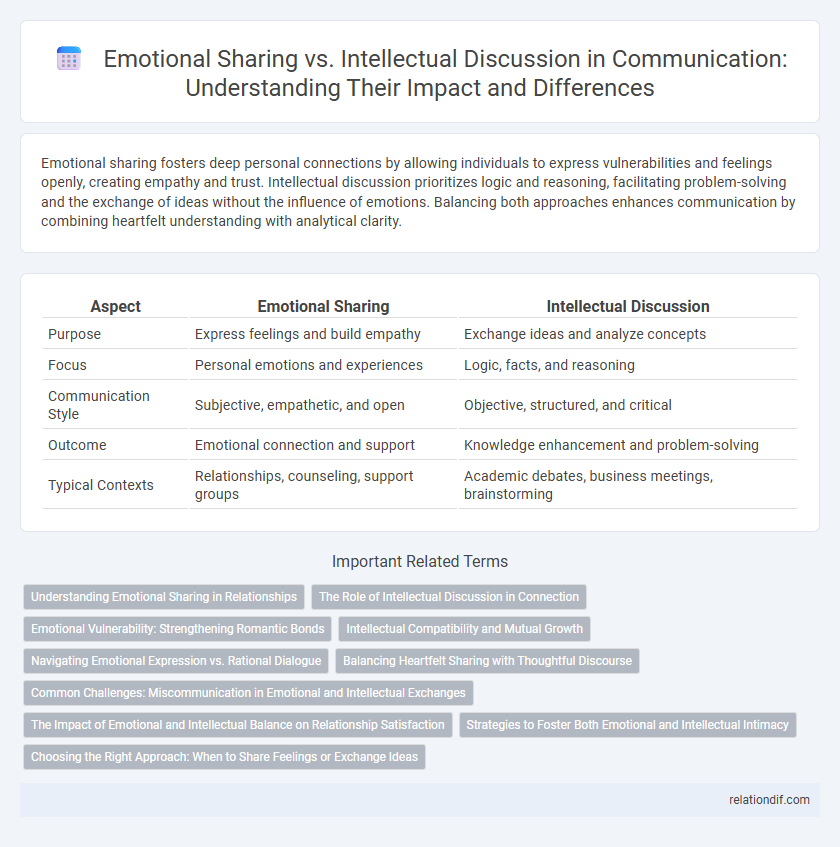Emotional sharing fosters deep personal connections by allowing individuals to express vulnerabilities and feelings openly, creating empathy and trust. Intellectual discussion prioritizes logic and reasoning, facilitating problem-solving and the exchange of ideas without the influence of emotions. Balancing both approaches enhances communication by combining heartfelt understanding with analytical clarity.
Table of Comparison
| Aspect | Emotional Sharing | Intellectual Discussion |
|---|---|---|
| Purpose | Express feelings and build empathy | Exchange ideas and analyze concepts |
| Focus | Personal emotions and experiences | Logic, facts, and reasoning |
| Communication Style | Subjective, empathetic, and open | Objective, structured, and critical |
| Outcome | Emotional connection and support | Knowledge enhancement and problem-solving |
| Typical Contexts | Relationships, counseling, support groups | Academic debates, business meetings, brainstorming |
Understanding Emotional Sharing in Relationships
Emotional sharing in relationships involves expressing feelings openly to foster empathy and deeper connection, which strengthens trust and mutual support. Unlike intellectual discussion that centers on logic and problem-solving, emotional sharing prioritizes vulnerability and emotional presence, allowing partners to validate each other's experiences. Research shows that couples who engage in emotional sharing report higher satisfaction and resilience during conflicts.
The Role of Intellectual Discussion in Connection
Intellectual discussion plays a crucial role in building meaningful connections by fostering mutual understanding through the exchange of ideas and critical thinking. Engaging in thoughtful dialogue enhances empathy and trust, as participants feel valued for their perspectives and insights. This cognitive engagement deepens relationships by creating a shared foundation of knowledge and respect.
Emotional Vulnerability: Strengthening Romantic Bonds
Emotional vulnerability in romantic communication fosters deeper intimacy by encouraging partners to share their true feelings without fear of judgment, creating a safe space for connection. Unlike intellectual discussions that prioritize logic and reasoning, emotional sharing builds trust and empathy, strengthening the overall bond between partners. Studies show couples who engage in open emotional expression experience higher relationship satisfaction and resilience to conflict.
Intellectual Compatibility and Mutual Growth
Intellectual compatibility in communication fosters deeper mutual growth by encouraging critical thinking and the exchange of diverse ideas. Engaging in thoughtful discussions enhances problem-solving skills and broadens perspectives, strengthening the bond between individuals. Prioritizing intellectual connection alongside emotional sharing creates a balanced dialogue that fuels continuous learning and personal development.
Navigating Emotional Expression vs. Rational Dialogue
Balancing emotional sharing and intellectual discussion requires recognizing the unique value each mode of communication brings to relationships and decision-making. Emotional expression fosters empathy and trust by allowing individuals to connect on a personal level, while rational dialogue promotes clarity and problem-solving through logical analysis. Effective communication involves skillfully navigating between these approaches to address both feelings and facts, ensuring mutual understanding and productive outcomes.
Balancing Heartfelt Sharing with Thoughtful Discourse
Balancing heartfelt sharing with thoughtful discourse enriches communication by fostering genuine emotional connections while encouraging rational exploration of ideas. Effective communicators recognize when to prioritize empathy and vulnerability, creating a safe space for emotional expression, and when to engage in analytical dialogue that deepens understanding. This dynamic interplay between emotional depth and intellectual clarity cultivates more meaningful and productive conversations.
Common Challenges: Miscommunication in Emotional and Intellectual Exchanges
Emotional sharing often faces challenges such as misinterpretation of feelings and overwhelming emotional intensity, which can lead to misunderstandings and defensive reactions. Intellectual discussions may struggle with abstract jargon and differing knowledge levels, causing confusion and disengagement between participants. Both communication types require active listening and empathy to bridge gaps and ensure clarity in conveying perspectives.
The Impact of Emotional and Intellectual Balance on Relationship Satisfaction
Emotional sharing fosters deeper intimacy by allowing partners to express vulnerabilities and build trust, while intellectual discussion stimulates mutual understanding and problem-solving. Maintaining a balance between these aspects enhances relationship satisfaction by addressing both emotional needs and cognitive compatibility. Couples thriving in communication demonstrate greater emotional connection and effective conflict resolution, leading to sustained relational happiness.
Strategies to Foster Both Emotional and Intellectual Intimacy
Effective communication strategies to foster both emotional and intellectual intimacy include active listening, which validates feelings while encouraging thoughtful dialogue. Encouraging open-ended questions allows partners to explore emotions and ideas deeply, strengthening mutual understanding. Balancing empathy with critical thinking creates a safe environment for sharing vulnerable emotions alongside intellectually stimulating conversations.
Choosing the Right Approach: When to Share Feelings or Exchange Ideas
Choosing between emotional sharing and intellectual discussion depends on the context and the desired outcome of the communication. Emotional sharing fosters empathy and deeper personal connections, especially in situations involving support or vulnerability, while intellectual discussion advances problem-solving and idea development in professional or analytical settings. Recognizing cues such as the emotional tone of the conversation or the nature of the issue can guide individuals in selecting the approach that best facilitates understanding and collaboration.
emotional sharing vs intellectual discussion Infographic

 relationdif.com
relationdif.com